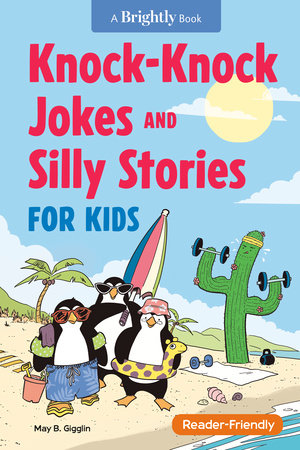How To Nurture Your Child’s Sense of Humor
by May B. Gigglin
Since I was little, I have loved nothing more than laughing and making other people laugh. It is such a great feeling when people laugh at my jokes, which makes the release of my joke book, Knock-Knock Jokes and Silly Stories for Kids, even more exciting. Nurturing a child’s humorous side can help them develop emotional and social skills, hone creativity, and increase their emotional health. I am here to help you get your kids writing and telling their own unique jokes!
You can use a few essential joke-writing components over and over to create big laughs.
The Element of Surprise
The most important part of joke writing is the element of surprise. This can come in many forms, but an unexpected joke ending will almost always cause a laugh. One way to create a surprise is to play with the audience’s expectations. Set them up so they think they know what is happening, and then — BAM! — pull out an unexpected punchline. Let’s look at this example:
JANELLE: I just fell off a fifty-foot ladder.
ELISA: Oh my goodness, are you okay?
JANELLE: Yeah, I fell off the first step.
This joke starts off with a scary initial line. What happened? How did this person fall? Are they okay? Since we can’t see them, we picture them lying in a hospital bed in casts and bandages. How tragic. But then those images are completely reversed by the last line. They are completely fine, falling just inches rather than fifty feet. This change in our expectations makes us laugh.
Use Wordplay
Something else that can make jokes hilarious is wordplay. Many words in the English language sound like other words, and saying one instead of the other will always lead to a chuckle. The most common way to do this is by using a pun. To write jokes like this, start by having your child write a list of words that sound similar: ketchup/catch up, ice cream/I scream, turnip/turn up, etc. These can easily turn into knock-knock jokes. Use the first word as the name of the person knocking, and then use it to replace the second word/phrase in the punchline. So you get something like:
“Knock, knock.”
“Who’s there?”
“Ketchup.”
“Ketchup, who?”
“Ketchup with me, and I will tell you!”
Puns also work great for words that have more than one meaning. Take the following joke, for example:
“Have you heard the story of the magic sandwich? Never mind, it’s just a bunch of bologna.”
This joke is funny because it takes advantage of the two definitions of “bologna,” both as sandwich meat and nonsense. Reading and writing jokes like this can help expand your child’s vocabulary and language skills.
Get Plenty of Practice
The most important thing to remember when helping your child write jokes is that creating the joke is more important than the end result. Professional comedians constantly write jokes that fail. What is important is that your child is writing and growing their comedic skills. The more they write, the better they will become. Not to mention, everyone has a unique sense of humor; something you may not find funny can be hilarious to someone else. Also, some of the funniest jokes are the ones that make absolutely no sense.
Make sure that your feedback is constructive and nurtures creativity. As an adult, my parents told me they were worried I would never have a “good” sense of humor because I wrote terrible jokes and spent too much time focusing on what made jokes funny. Luckily, they never said this to me as a kid. Instead, they were supportive and continued to joke with me. Now, I make jokes professionally! Joke writing and humor are skills that need to develop over time, and there is nothing better than following the laughs that happen along the way.
-
Buy the Book:

